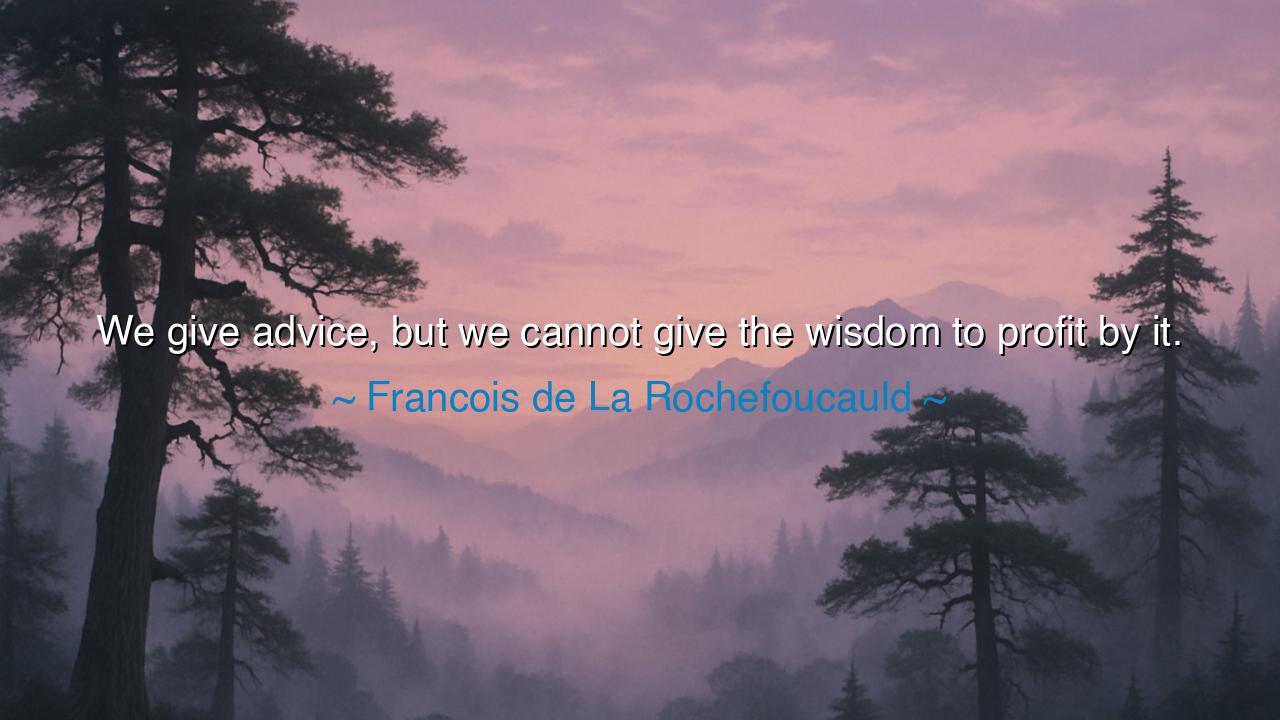
We give advice, but we cannot give the wisdom to profit by it.






François de La Rochefoucauld, the philosopher of the human soul, speaks with a truth as clear as the winds of time: “We give advice, but we cannot give the wisdom to profit by it.” In these words lies the painful but undeniable reality that advice, though freely offered, is not always received with the depth of understanding necessary to act upon it. Wisdom is not simply the ability to offer counsel, but the ability to hear it, to internalize it, and, most importantly, to apply it with discernment and courage. Advice may be given, but wisdom is earned and nurtured through experience, reflection, and the maturity to see beyond one’s immediate desires.
The meaning is deep and resonant. Advice is abundant in the world; it flows freely from friends, family, and strangers alike. Yet how often does it fall on deaf ears, or, at best, is ignored until the consequences of ignorance become unbearable? Wisdom is a rare companion, one that does not arrive with the mere passing of years, but through a process of trial, failure, and the openness of the heart to learn from one’s mistakes. True wisdom does not come from external sources alone; it is shaped by personal experience, the internalization of lessons, and the courage to face the truths of life, no matter how difficult.
Consider the example of King Solomon, renowned for his wisdom, yet still caught in the folly of his own desires. He advised his people to seek wisdom above all else, and yet he himself strayed into excess, indulging in wealth, power, and foreign alliances that led to his kingdom’s eventual division. His wisdom was undeniable, yet he lacked the self-discipline to profit from it. His story echoes La Rochefoucauld’s insight: advice and wisdom may be abundant, but the ability to profit from it—by acting with clarity and restraint—requires something deeper.
This truth is echoed in the lives of countless individuals who seek advice, only to ignore it until experience forces their hand. The teachings of Socrates or the counsel of wise elders can offer the key to a good life, but it is only through the discipline of reflection and the wisdom of self-understanding that one can act upon it. Wisdom, as La Rochefoucauld suggests, is not a gift we can give to others—it must be cultivated by the individual, through experience and the capacity to learn from the world around them.
Therefore, let the seeker understand this: advice is plentiful, but wisdom is rare. It is not enough to hear the counsel of the wise; one must live with the humility to learn from it, the patience to reflect on it, and the courage to apply it. La Rochefoucauld’s words remind us that true wisdom cannot be handed to another; it must be earned through personal growth, the kind that only time, experience, and self-reflection can bestow.






__n_Nguy_n_gunner
I can’t help but think about the ethical implications. If one knows that advice may not be effectively used, should they still offer it? Or does withholding advice risk greater harm? It also makes me wonder about the cultural differences in valuing wisdom versus mere instruction. Could societal norms and upbringing influence how well someone can profit from advice, and if so, how might we structure guidance to bridge that gap more effectively?
PTPhuong Thao
Reading this, I feel both humbled and frustrated. Humbling because it reminds me that even the wisest guidance is useless without the ability to apply it; frustrating because so many people, myself included, often miss opportunities simply due to a lack of insight. It sparks curiosity: are there patterns or practices that can systematically improve one’s capacity to convert advice into meaningful results, or is it always situational and unpredictable?
TTKieu Trang Tran
Is it possible that some people consistently fail to benefit from guidance because of emotional or psychological barriers? I keep thinking about situations where individuals seem to ignore good advice despite its clear value. Could there be a way to enhance the receptivity to advice, or is that also beyond anyone’s control? It makes me question the balance between the quality of advice and the personal readiness to act upon it.
DHNguyen Duy Hieu
I find this perspective slightly unsettling because it suggests limits to how much we can help others. If advice alone cannot guarantee meaningful action, then what role do mentors or educators truly play? Should we then focus less on giving instructions and more on teaching the skills to interpret and implement advice? It raises the question: how much responsibility lies with the advisor versus the advised in creating real change?
HTLuffy Vua Hai Tac
This makes me wonder if true wisdom is entirely self-taught. Even when we receive guidance from the most knowledgeable mentors, we often struggle to apply it effectively. Does this imply that some people are inherently more capable of learning from advice, or is it purely a matter of experience and reflection? I feel like understanding the distinction between knowledge and wisdom is key, but how can one cultivate that ability intentionally rather than relying on chance experiences?